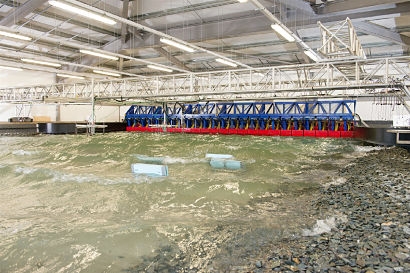
WaveRoller is a submerged wave energy converter based on a hinged panel that is attached to the sea bed in the near shore area. It generates electricity from the movement of the waves (known as the ‘surge phemonenon’) and is connected to the electric grid onshore.
A testing programme conducted by AW-Energy and Queen’s University Belfast concluded in January 2018 and the results have now been analysed. The project focused on recording the loads of different WaveRoller components, mainly the foundation and the panel. According to AW-Energy Marine Engineer Matti Vuorinen, the main purpose of the tests was to acquire a better understanding of the extreme loads and compare them to the loads used in the design.
The tests covered a wide range of design conditions of varying tides, sea states and wave directions. The test results showed that the design loads were accurately derived from the combination of numerical methodology and sea trial data. Information on how the loading changes when some parts of the foundation are removed was also gathered during the tests.
“The design loads were not exceeded yet weren’t too conservative either” Vuorinen said. “This confirms our design methods are working well”.
The research received funding from the European Union Horizon 2020 Framework Programme (H2020), the biggest EU Research and Innovation programme to date.
AW-Energy has applied for additional MaRINET2 funding to continue the cooperation with Queen’s University Belfast. As the QUB facilities have been purpose-built for developing wave energy in the nearshore environment they provide an optimal setting for advancing the WaveRoller technology further.
“It is very satisfying that our expertise and tank facilities are being used by AW-Energy towards the development of commercial scale wave power generation” said Trevor Whittaker, Professor of Coastal Engineering at Queen’s University Belfast. “This fits the mission statement for our marine energy group at Queen’s which is ‘research excellence towards commercial development’. We are very pleased to be working with the company on such an exciting and pioneering project”.
MaRINET2 is a 10.5 million euro project which includes 39 organisations representing some of the top offshore renewable energy testing facilities in Europe and globally. The project depends on strong international ties across Europe and draws on the expertise and participation of 13 countries.
For additional information:

